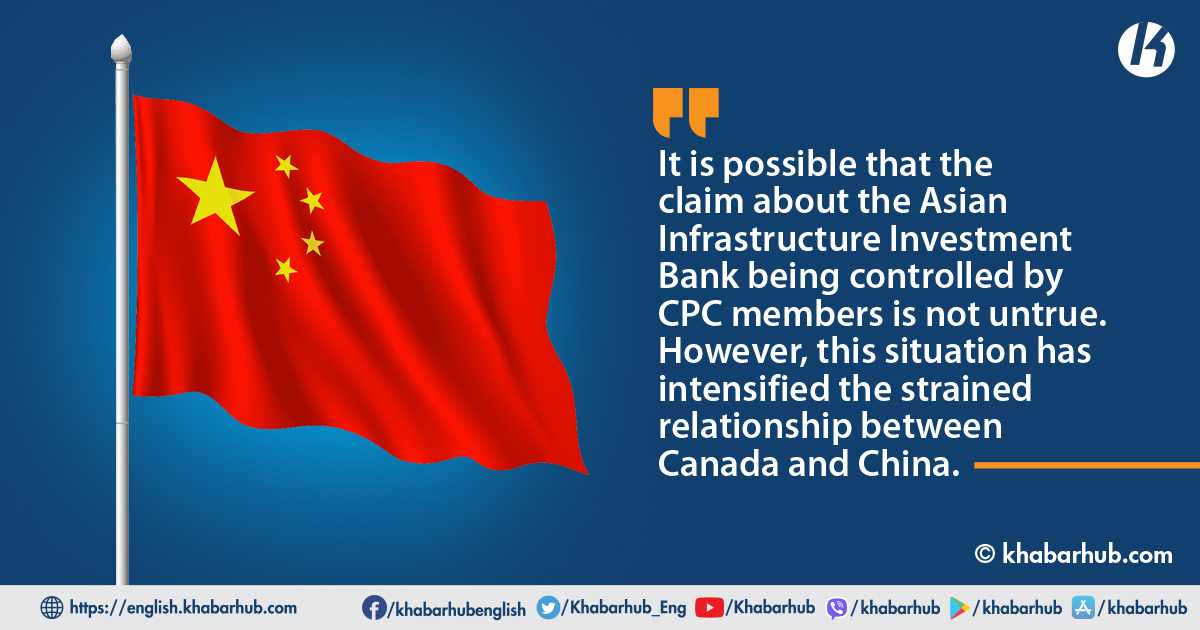China and Canada found themselves in conflict once more, this time over the matter of the Asian Infrastructure Investment Bank (AIIB), a multinational development bank led by Beijing.
The AIIB has faced allegations of being controlled primarily by members of the Communist Party of China (CPC).
Just a few weeks back, China and Canada engaged in a diplomatic confrontation, leading to a further deterioration of their bilateral relations.
On May 8, Toronto expelled Chinese diplomat Zhao Wei, accusing him of intimidating Canadian lawmaker Michael Chong and Chong’s relatives in Hong Kong.
The Canadian lawmaker has been known for his vocal criticism of China’s treatment of the Uyghur Muslim minority in the Xinjiang region.
In response to Zhao Wei’s expulsion, China retaliated by expelling Jennifer Lynn Lalonde, a high-ranking Canadian diplomat based in the Shanghai Consulate, on May 9.
It alleged the presence of three Chinese police stations in Toronto and two in Vancouver, which purportedly serve to persuade individuals claimed by Chinese authorities as fugitives to return to China to face charges.
While tensions remained high from these diplomatic conflicts, Canada took additional action by issuing an order for its government departments and agencies to cease all dealings with the AIIB.
This decision came at a time when discussions surrounding the bank’s alleged dominance by members of the Communist Party of China (CPC) were ongoing and unresolved.
The Canada-China relations faced another major setback when Bob Pickard, a Canadian national and the Global Communication Director of the China-led multilateral bank, resigned.
Pickard publicly accused the organization of being controlled by members of the Communist Party of China (CPC), intensifying the brewing storm.
As a result, Canada’s Finance Minister Chrystia Freeland took action on June 14 by instructing government agencies and departments to halt all engagements with the AIIB.
It is noteworthy that Canada had officially become a member of the China-backed banking institution in March 2018.
The AIIB responded to the accusation by describing it as “baseless and disappointing,” while emphasizing their commitment to their multilateral mission and the diversity of their international team.
According to The Guardian, Canada’s opposition Conservative Party has consistently called for the country to withdraw from the AIIB, alleging that it serves as a means for Beijing to spread authoritarianism across the Pacific region.
This latest development signifies an additional decline in the already strained relations between China and Canada.
The situation began deteriorating when Huawei Technologies executive Meng Wanzhou was arrested by Canadian authorities in December 2018.
Since then, the bilateral relationship has faced numerous challenges and become increasingly strained.
Seven years ago, Meng Wanzhou, the Chief Financial Officer of Huawei Technologies, was arrested in Vancouver at the request of the United States.
The U.S. alleged that she misled HSBC bank regarding the true nature of Huawei’s association with the Iran-based company Skycom.
The U.S. Department of Justice accused Meng of participating in a fraudulent scheme to acquire prohibited American goods and technology for Skycom, which was believed to be an unofficial subsidiary of Huawei.
It was alleged that money was transferred out of Iran through this company by deceiving HSBC.
In response to Meng’s arrest, China retaliated by detaining two Canadian citizens, Michael Spavor and Michael Kovrig, who were subsequently released in exchange for Meng Wanzhou’s freedom in 2021.
These actions only further strained the already deteriorating ties between China and Canada.
Another incident that strained relations occurred in March of this year when Beijing was accused of interfering in Canadian elections.
In response to demands from the opposition Conservative Party, the government of Justin Trudeau initiated an investigation into the allegations.
While this investigation is ongoing, continuous accusations against China for its alleged wrongdoings towards Canada have severely damaged diplomatic relations between the two countries.
One significant issue contributing to the breakdown in relations is China’s alleged establishment of police stations on Canadian soil to intimidate or harass Canadians of Chinese origin.
While the accusation that the Asian Infrastructure Investment Bank (AIIB) is dominated by CPC cardholders may not be unfounded, it has further strained relations between Canada and China.
The Chinese Canadian population, numbering around 1.77 million, is considered the second-largest ethnic group in the country.
On May 14, Canada’s Public Safety Minister, Marco Mendicino, revealed that there may be more Chinese police stations operating in the country.
The Royal Canadian Mounted Police has launched a probe into the suspected Chinese police stations operating secretly in Quebec, specifically in Montreal and Brossard, according to reports.
Safeguard Defenders, a Spanish human rights organization, stated in its September 2022 report that dozens of Chinese police stations are operational worldwide.
It alleged the presence of three Chinese police stations in Toronto and two in Vancouver, which purportedly serve to persuade individuals claimed by Chinese authorities as fugitives to return to China to face charges.
These secret police outposts are also accused of undermining democratic institutions in foreign countries and assisting Chinese organizations in stealing economic, technological, and political secrets.
However, the Chinese Foreign Ministry consistently defends these allegations by describing the foreign outposts as service stations for Chinese citizens living abroad, assisting them with matters such as obtaining driving licenses or searching for partners.
Nevertheless, there are concerns about China’s lack of transparency and hiding the truth.
While the accusation that the Asian Infrastructure Investment Bank (AIIB) is dominated by CPC cardholders may not be unfounded, it has further strained relations between Canada and China.
The ongoing deterioration in their relations continues to escalate due to these various issues.









Comment